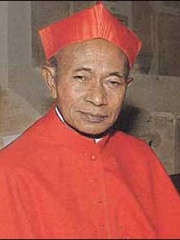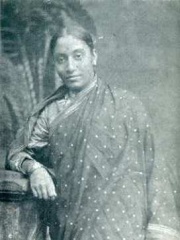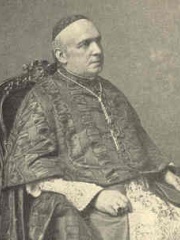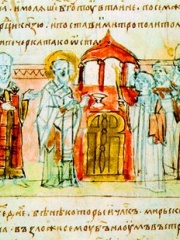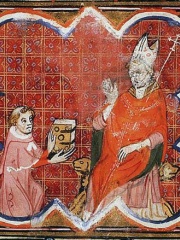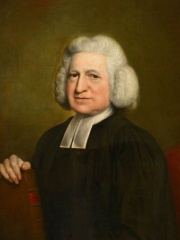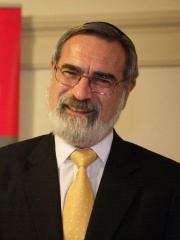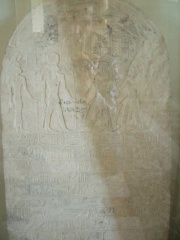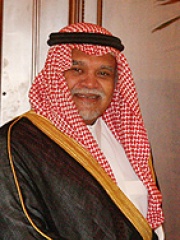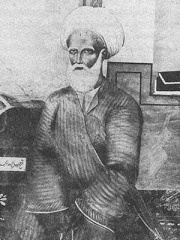RELIGIOUS FIGURE
Uthman ibn Maz'un

 Uthman ibn Maz'un
Uthman ibn Maz'un
ʿUthmān ibn Maẓʿūn (Arabic: عثمان بن مظعون) was one of the Companions of the Islamic prophet Muhammad. Read more on Wikipedia
His biography is available in 19 different languages on Wikipedia (up from 17 in 2024). Uthman ibn Maz'un is the 2,188th most popular religious figure (down from 1,738th in 2024), the 197th most popular biography from Saudi Arabia and the 79th most popular Saudi Arabian Religious Figure.
Memorability Metrics
Page views of Uthman ibn Maz'un by language
Among RELIGIOUS FIGURES
Among religious figures, Uthman ibn Maz'un ranks 2,188 out of 3,187. Before him are Pope Maximus of Alexandria, Laurentius Petri, Armand Razafindratandra, Rukhmabai, Domenico Ferrata, and Hilarion of Kiev. After him are William of the White Hands, Charles Wesley, Jonathan Sacks, Matrona Nikonova, Pami, and François de Tournon.
Most Popular Religious Figures in Wikipedia
Go to all RankingsPope Maximus of Alexandria
250 - 282
HPI: 59.73
Rank: 2,182
Laurentius Petri
1499 - 1573
HPI: 59.72
Rank: 2,183
Armand Razafindratandra
1925 - 2010
HPI: 59.71
Rank: 2,184
Rukhmabai
1864 - 1955
HPI: 59.70
Rank: 2,185
Domenico Ferrata
1847 - 1914
HPI: 59.69
Rank: 2,186
Hilarion of Kiev
990 - 1055
HPI: 59.68
Rank: 2,187
Uthman ibn Maz'un
HPI: 59.68
Rank: 2,188
William of the White Hands
1135 - 1202
HPI: 59.67
Rank: 2,189
Charles Wesley
1707 - 1788
HPI: 59.67
Rank: 2,190
Jonathan Sacks
1948 - 2020
HPI: 59.67
Rank: 2,191
Matrona Nikonova
1881 - 1952
HPI: 59.65
Rank: 2,192
Pami
900 BC - 800 BC
HPI: 59.65
Rank: 2,193
François de Tournon
1489 - 1562
HPI: 59.65
Rank: 2,194
In Saudi Arabia
Among people born in Saudi Arabia, Uthman ibn Maz'un ranks 197 out of 354. Before him are Aban ibn Uthman (641), Abu Dujana (null), Al-Hurr ibn Abd al-Rahman al-Thaqafi (700), Saeed Al-Owairan (1967), Al-A'sha (570), and Abdulaziz bin Muhammad Al Saud (1721). After him are Ka'b ibn Zuhayr (700), Umamah bint Zainab (null), Al-Bara' ibn Azib (600), Bandar bin Sultan Al Saud (1949), Sharif Ali (1450), and Nafiʽ al-Madani (689).
Others born in Saudi Arabia
Go to all RankingsAban ibn Uthman
HISTORIAN
641 - 723
HPI: 60.82
Rank: 191
Abu Dujana
RELIGIOUS FIGURE
HPI: 60.44
Rank: 192
Al-Hurr ibn Abd al-Rahman al-Thaqafi
POLITICIAN
700 - 800
HPI: 60.41
Rank: 193
Saeed Al-Owairan
SOCCER PLAYER
1967 - Present
HPI: 60.29
Rank: 194
Al-A'sha
WRITER
570 - 629
HPI: 60.17
Rank: 195
Abdulaziz bin Muhammad Al Saud
POLITICIAN
1721 - 1803
HPI: 59.87
Rank: 196
Uthman ibn Maz'un
RELIGIOUS FIGURE
HPI: 59.68
Rank: 197
Ka'b ibn Zuhayr
WRITER
700 - 662
HPI: 59.64
Rank: 198
Umamah bint Zainab
RELIGIOUS FIGURE
HPI: 59.56
Rank: 199
Al-Bara' ibn Azib
RELIGIOUS FIGURE
600 - 690
HPI: 59.42
Rank: 200
Bandar bin Sultan Al Saud
POLITICIAN
1949 - Present
HPI: 59.11
Rank: 201
Sharif Ali
RELIGIOUS FIGURE
1450 - 1432
HPI: 58.85
Rank: 202
Nafiʽ al-Madani
RELIGIOUS FIGURE
689 - 785
HPI: 58.42
Rank: 203
Among RELIGIOUS FIGURES In Saudi Arabia
Among religious figures born in Saudi Arabia, Uthman ibn Maz'un ranks 79. Before him are Shaykh Ahmad (1753), Asma bint Umais (null), Lubaba bint al-Harith (593), Saleh Al-Fawzan (1933), Fadl ibn Abbas (614), and Abu Dujana (null). After him are Umamah bint Zainab (null), Al-Bara' ibn Azib (600), Sharif Ali (1450), Nafiʽ al-Madani (689), Utba ibn Ghazwan (581), and Saud Al-Shuraim (1964).
Shaykh Ahmad
1753 - 1826
HPI: 62.83
Rank: 73
Asma bint Umais
HPI: 62.21
Rank: 74
Lubaba bint al-Harith
593 - 655
HPI: 62.18
Rank: 75
Saleh Al-Fawzan
1933 - Present
HPI: 61.47
Rank: 76
Fadl ibn Abbas
614 - 639
HPI: 61.01
Rank: 77
Abu Dujana
HPI: 60.44
Rank: 78
Uthman ibn Maz'un
HPI: 59.68
Rank: 79
Umamah bint Zainab
HPI: 59.56
Rank: 80
Al-Bara' ibn Azib
600 - 690
HPI: 59.42
Rank: 81
Sharif Ali
1450 - 1432
HPI: 58.85
Rank: 82
Nafiʽ al-Madani
689 - 785
HPI: 58.42
Rank: 83
Utba ibn Ghazwan
581 - 639
HPI: 57.79
Rank: 84
Saud Al-Shuraim
1964 - Present
HPI: 56.93
Rank: 85


